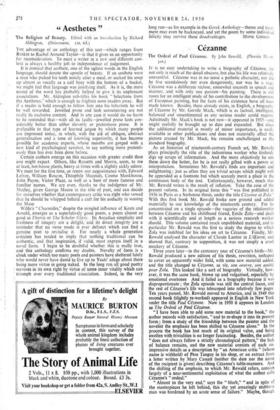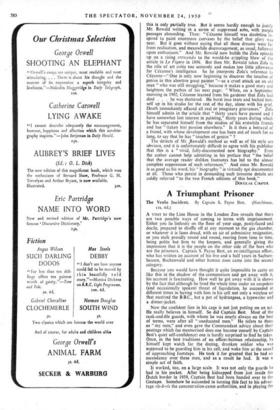Cezanne
Jr is no easy undertaking to write a biography of Cezanne, for not only is much of the detail obscure, but also his life was relatively uneventful. Cezanne was in no sense a pathetic character, nor did he live scandalously nor even dangerously, nor was lie, a sage. Cezanne was a deliberate recluse, somewhat uncouth in speech and manner, and with only one passion—his painting. There. is still room for an intelligent study of his contribution to the development of European painting, but the facts of his existence have all been made known. Besides, there already exists, in English, a biography of Cezanne by Mr. Gerstle Mack, which is as factual, intelligent, balanced and unsentimental as any serious reader could require, Admittedly Mr. Mack's book is not new—it appeared in 1935—and might usefully be brought up to date and expanded. But since the additional material is mostly of minor importance,. is easily available in other publications and does not materially. affect the picture created by Mr. Macjc, his remains unchallenged as the standard biography.
As an historian of nineteenth-century French art, Mr. Rewald plays principally the role of the industrious worker who tirelessly digs up scraps of information. And the more objectively he sets these down the better, for he is not really gifted with a ,power of interpretation. Sometimes Mr. Rewald's finds are important and enlightening ; just as often they are trivial scraps which might well be appended as a footnote but which scarcely merit a place in the continuous body of the text. Unfortunately, however, much that Mr. Rewald writes is the result of inflation. Take the case of the present volume. In its original form this "was first published in 1936 in Paris as a Sorbonne thesis, under the title Cizanne et Zola." With this first book Mr. Rewald broke new ground and added materially to our knowledge of the nineteenth century. For he concentrated on a single episode—the vagaries of the relationship between Cezanne and his childhood friend, Emile Zola--and dealt with it scientifically and at length as a serious research worker should. This volume contained much unpublished material, and in particular Mr. Rewald was the first to study the degree to which Zola was indebted for his ideas on art to Cezanne. Finally, Mr. Rewald analysed the character of Claude Lantier in L'CEtivre, and showed that, contrary to supposition, it was not simply a cruel mockery of Cezanne. Three years later—in the centenary year of Cezanne's birth—Mr. Rewald produced a new edition of his thesis, rewritten, reshaped to cover an apparently wider field, with some new material added, and the title changed to Cezanne, sa vie, son oeuvre, son amide pour Zola. This looked like a sort of biography. Virtually, how- ever, it was the same book, blown up and vulgarised, especially by emotional overtones And it failed as a biography because it was disproportionate ; the Zola episode was still the central focus, and the rest of Cezanne's life was telescoped into relatively, few pages. Ten years passed, Mr. Rewald moved to America, and in 1949 this second book (slightly re-worked) appeared in English in New York under the title Paul Cezanne. Now in 1950 it appears 'hi London as The Ordeal of Paul Cizanne. "I have been able to add some new material to the book," the author records with satisfaction, "and to re-shap,e it into its present form ; from a study of the friendship between the painter and the novelist the emphasis has been shifted to Cezanne alone." In the process the book has lost much of its original value, and being swollen with trivialities is no longer fascinating. Besides, the author " does not always follow a strictly chronological pattern," the lack of balance remains, and the new material consists of such un- impressive details as a description by "an American critic" (whose name is withheld) of Pere Tanguy in his shop, or an extract from a letter written by Mary Cassatt (neither the date nor the name of the recipient is given) describing Cezanne's table-manners. And the shifting of the emphasis, to which Mr. Rewald refers, consists largely of a near-sentimental exploitation of what the author calls Cezanne's "ordeal."
"Almost to the very end," says the "blurb," "and in spite of the masterpieces he left behind, this shy yet amazingly stubborn man was burdened by an acute sense of failure." Maybe, though this is only partially true. But it seems hardly enough to justify Mr. Rewald writing in a series of suppressed sobs, with purple passages abounding. Thus: " Cezanne himself was doubtless in. spired to paint enormous canvases by the belief that glory wai near. But it goes without saying that all these dreams were far from realisation, and meanwhile discouragement, as usual, followed upon enthusiasm." And Mr. Rewald now builds the Zola episode up on a rising crescendo to the would-be crippling blow of the article in Le Figaro in 1896. But then Mr. Rewald takes Zola in the role of art critic too seriously and makes too little allowanze for Cezanne's intelligence. So he interprets Zola's reference to Cezanne—" One is only now beginning to discover the touches of genius in this abortive great painter "—as a cruel attack on an old man " who was still struggling," because it makes a good story and heightens the pathos of his next page: "When, on a September morning in 1902, Cezanne learned from his gardener that Zola had died . . . he was shattered. He burst into tears and locked him- self up in his studio for the rest of the day, alone with his grief. Death immediately effaced all real or imaginary grievances." Zola himself admits in the article that " thirty years have passed and I have somewhat lost interest in painting," thirty years during which he has separated himself from the studios of his erstwhile friends and has " (taken his) passion elsewhere." Is it then a betrayal of a friend, with whose development one has been out of touch for so long, to say that he has "touches of genius"
The defects of Mr. „Rewald's method as well as of his style are obvious, and it is unfortunately difficult to agree with his publisher that this is a " vivid, fully-documented new biography." Even the author cannot help admitting in his preface that "the belief that the average reader dislikes footnotes has led to the almost complete suppression of such references." And since Mr. Rewald is as good as his word, his " biography" is virtually not documented at all. Those who persist in demanding such tiresome details are coldly referred "to the two French editions of this book."
DOUGLAS COOPER.















































































 Previous page
Previous page